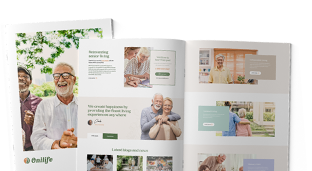Introduction to NDIS
Benefits
- Individualised Plans
- Lifetime Support
- Choice and Control
- Capacity Building
- Social and Economic Participation
- Funding Certainty
- Holistic Approach
- Support Coordination
Download Our Guide
To better understand the lifestyle options and which one is right for you or your loved one, check out our guide to senior housing.

Benefits of the NDIS
The National Disability Insurance Scheme (NDIS) is an Australian Government initiative that provides funding and support to individuals with permanent and significant disabilities. The scheme is designed to enhance the quality of life for participants by enabling access to essential services, therapies, and assistance that promote independence and social inclusion.
The NDIS operates under the principles of choice and control, allowing participants to select the services and providers that best meet their needs.
How Does the NDIS Work?
The NDIS is a needs-based program where eligible participants receive funding tailored to their specific disability-related requirements. This funding covers a wide range of supports and services that help individuals achieve their personal, social, and professional goals.
Key Aspects of the NDIS:
Eligibility: The NDIS is available to Australian citizens, permanent residents, or protected Special Category Visa holders under the age of 65 with a permanent and significant disability.
Funding: The funding is personalized and varies based on an individual’s needs, focusing on capacity building, daily support, and access to essential services.
NDIS Plans: Each participant receives an NDIS plan, which outlines their funding and approved supports. This plan is regularly reviewed to ensure it remains aligned with the participant’s needs.
Self-Management vs. Plan Management: Participants can choose to manage their own NDIS funds, have a plan manager assist them, or let the NDIA manage their funding directly.
What Services are Covered Under the NDIS?
The NDIS provides funding for a variety of services and supports that fall into three categories:
1. Core Supports
Daily personal care (bathing, dressing, meal preparation)
Assistance with household tasks
Transport services
Consumables (continence products, assistive technology)
2. Capacity Building Supports
Therapy services (occupational therapy, speech therapy, physiotherapy)
Social and community participation
Skill development programs
Employment support
3. Capital Supports
Assistive technology (wheelchairs, communication devices)
Home modifications
Specialist Disability Accommodation (SDA)
How Careable Supports NDIS Participants
As a registered NDIS provider, Careable is committed to helping participants navigate and maximize their NDIS plans. Our services include:
1. Personalized Support Plans
We collaborate with participants to develop tailored support plans that align with their goals and preferences.
2. Supported Independent Living (SIL)
We provide safe and structured accommodation that fosters independence while ensuring essential care is available.
3. Community Access & Social Inclusion
Careable encourages active participation in the community through skill-building activities, social programs, and engagement opportunities.
4. NDIS Plan Management & Coordination
Our experts assist participants in managing their funding efficiently, ensuring they receive the best support while staying within their allocated budgets.
Get in Touch with Careable
Navigating the NDIS can be complex, but you don’t have to do it alone. Let Careable guide you with expert support and personalized care.
📞 Call us at 1300 DECIDE
📩 Email us at cx@careable.com.au
🌐 Visit our website: careable.com.au
Take control of your NDIS journey with Careable – Where Compassion is at the Heart of Our Care.
FAQs about the NDIS
The NDIS provides funding for individuals with disabilities to access essential services and supports that enhance their independence and quality of life.
Eligibility is based on age, residency, and disability requirements. Participants must be under 65 years old and have a permanent and significant disability.
Careable offers comprehensive support services, including personal care, community participation, SIL, and support Coordination
To apply, individuals need to complete an Access Request Form through the NDIA and provide relevant medical documentation. Careable can assist in this process.

